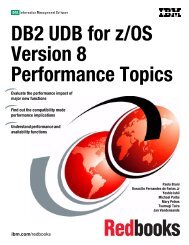Download PDF (1.3 MB) - IBM Redbooks
Download PDF (1.3 MB) - IBM Redbooks
Download PDF (1.3 MB) - IBM Redbooks
You also want an ePaper? Increase the reach of your titles
YUMPU automatically turns print PDFs into web optimized ePapers that Google loves.
4.15.3 Maintaining correct table indexing<br />
The SQL Access Advisor, available from the Enterprise Manager, provides suggestions for<br />
schema changes, including changes to indexes. You can find the SQL Access Advisor by<br />
starting at the database home page, then following the Advisor Central link in the Related<br />
Links section at the bottom of the page.<br />
In our internal evaluation, we found that the following indexes are often helpful for BPMN<br />
business processes. Consider these indexes as a starting point for defining indexes, and add<br />
more indexes as described previously.<br />
► create index PS.TASK_BIS on PS.LSW_TASK("BPD_INSTANCE_ID","STATUS");<br />
► create index PDW.TASK_IDS on PDW.LSW_TASK("SYSTEM_ID","SYSTEM_TASK_ID");<br />
► create index PS.TASK_UGI on PS.LSW_TASK("USER_ID","GROUP_ID","TASK_ID");<br />
► create index PS.TASK_UI on PS.LSW_TASK("USER_ID","TASK_ID");<br />
4.15.4 Sizing log files appropriately<br />
Unlike DB2, Oracle performs an expensive checkpoint operation when switching logs. The<br />
checkpoint involves writing all dirty pages in the buffer cache to disk. Therefore, an important<br />
steps is to make the log files large enough that switching occurs infrequently. Applications that<br />
generate a high volume of log traffic need larger log files to achieve this goal.<br />
4.15.5 Using the Oracle SQL Tuning Advisor for long running SQL statements<br />
If analysis shows that a particular SQL statement is taking a long time to execute, it might be<br />
because the Oracle database is executing the SQL in a non-optimal manner. The Oracle SQL<br />
Tuning Advisor can be used to optimize the performance of long running SQL statements.<br />
Use the following methodology to identify, and improve, the performance of these SQL<br />
statements:<br />
►<br />
►<br />
►<br />
4.15.6 File system tuning<br />
Identify long-running SQL statements by using an AWR report, or through the Event<br />
Manager.<br />
Run the SQL Tuning Advisor against the long-running SQL statements.<br />
Evaluate and accept (as is appropriate) the recommendations from the SQL Tuning<br />
Advisor.<br />
For redo logs and control files on AIX, use a file system with agblksize parameter set to 512.<br />
For other file systems, use the default agblksize.<br />
4.15.7 Creating table spaces<br />
When creating table spaces, consider minimizing the number of table space expansions<br />
(extends) that occur by setting large initial and autoextend sizes. This step can help produce<br />
fewer spikes in database utilization under peak load.<br />
Alternatively, manually extend the table spaces during periods of relatively low activity to<br />
mitigate this issue.<br />
Chapter 4. Performance tuning and configuration 89
















